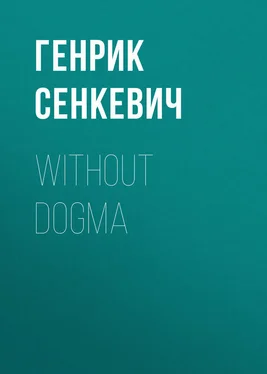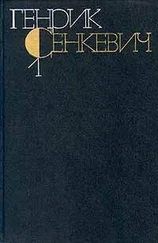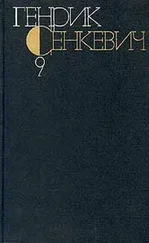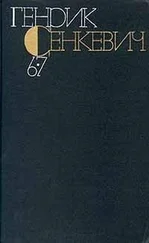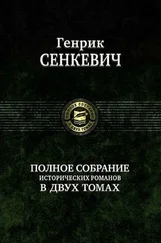Генрик Сенкевич - Without Dogma
Здесь есть возможность читать онлайн «Генрик Сенкевич - Without Dogma» — ознакомительный отрывок электронной книги совершенно бесплатно, а после прочтения отрывка купить полную версию. В некоторых случаях можно слушать аудио, скачать через торрент в формате fb2 и присутствует краткое содержание. Жанр: foreign_antique, foreign_prose, на английском языке. Описание произведения, (предисловие) а так же отзывы посетителей доступны на портале библиотеки ЛибКат.
- Название:Without Dogma
- Автор:
- Жанр:
- Год:неизвестен
- ISBN:нет данных
- Рейтинг книги:4 / 5. Голосов: 1
-
Избранное:Добавить в избранное
- Отзывы:
-
Ваша оценка:
- 80
- 1
- 2
- 3
- 4
- 5
Without Dogma: краткое содержание, описание и аннотация
Предлагаем к чтению аннотацию, описание, краткое содержание или предисловие (зависит от того, что написал сам автор книги «Without Dogma»). Если вы не нашли необходимую информацию о книге — напишите в комментариях, мы постараемся отыскать её.
Without Dogma — читать онлайн ознакомительный отрывок
Ниже представлен текст книги, разбитый по страницам. Система сохранения места последней прочитанной страницы, позволяет с удобством читать онлайн бесплатно книгу «Without Dogma», без необходимости каждый раз заново искать на чём Вы остановились. Поставьте закладку, и сможете в любой момент перейти на страницу, на которой закончили чтение.
Интервал:
Закладка:
ROME, 12 January.
Yesterday I allowed myself to be carried away by my writing. But all the same it seems to me that I laid a finger upon the rottenness of my soul and that of humanity. There are times when I am indifferent to these questions; then again they seem to tear at me without mercy; all the more as those are matters kept within the privacy of the soul. It would be better to put them aside; but they are too important for that. We want to know what we are to expect, and arrange our life accordingly. I have tried to say to myself: "Stop, you will never leave that enchanted circle; why enter it at all?" I have every qualification to render myself a well-satisfied, cheerful animal; but I cannot always be satisfied with that. It is said the Slav temperament has a tendency towards mysticism. I have noticed that our greatest writers and poets end by becoming mystics. It is not surprising that lesser minds should be now and then troubled. As to myself I feel obliged to take notice of those inward struggles in order to get a faithful image of myself. Perhaps I feel also the want of justifying myself before my own conscience. For instance, with the great "I do not know" before me, I still observe the regulations of the Church; yet do not consider myself a hypocrite. This would be the case if, instead of the "I do not know," I could say "I know there is nothing." But our scepticism is not an open negation; it is rather a sorrowful, anxious suspicion that perhaps there is nothing, – a dense fog around our minds that stifles the breath and hides from us the light. I therefore stretch out my hands towards that sun that maybe shines beyond the mist. I fancy that not I alone am in that position, and that of all those who go to church and mass on Sundays the prayers might be condensed in these words: "O God! lift the mist!"
I cannot write coldly or dispassionately about all this. I keep religious observances for the simple reason that I long to believe, and since the sweet teaching of my childhood tells me that faith is a gift of grace, I am waiting for that grace. I am waiting that it may be given unto me; that my soul may believe unquestioningly, even as it believed in childhood. Those are my motives; no self-interest prompts me; it would be much easier to be a cheerful, contented animal. Since I am justifying my outward semblance of piety, I have some other less noble and more practical reasons. From the days of my childhood I have been accustomed to keep certain rules, and they have grown into a habit. Henry the Fourth said Paris was well worth a mass; so say I that the peace of those nearest is worth a mass; people of my class, as a rule, observe religious prescriptions, and I should protest against the outward symbols only in such a case if I could find something more conclusive to say than "I do not know." I go to church because I am a sceptic in regard to my own scepticism. It is not a comfortable feeling, and my soul drags one wing along the earth. But it would be much worse with me if I always pondered over these questions so earnestly as I have done while writing these last pages. Fortunately for me this is not the case. I have mentioned already that at times I am indifferent to them. Life carries me along, and although in the main I know what to think of its hollow pleasures, I give myself up to it altogether, and then the moral "to be, or not to be" has no meaning for me. A strange thing, about the power of which not much has been said, is the influence of social suggestion on the mind. In Paris, for instance, I feel happier not only because the continual mill deafens me, – I am swallowed up by the surging masses, and my mind is diverted by tricks of the fencing ring, – but also because the people there, without being conscious of it, live as if it were worth their while to put all their energies into this life, and as if beyond there was nothing but a chemical process. My pulse begins to beat in unison with theirs; I feel myself in harmony with my surroundings; amuse myself or bore myself, conquer or am conquered, but enjoy a comparative rest.
ROME, BABUINO, 13 January.
I have only four days left before my departure, and will now sum up what I said about myself. I am an individual rather worn out, very sensitive, and of a highly nervous temperament. I have a strongly developed consciousness of self, seconded by comparative culture, and taken altogether, may consider myself an intellectually developed being.
My scepticism debars me from all firm convictions. I look, observe, criticise, sometimes fancy I get hold of some essential truth, but am ready always to doubt even that. I have already said all that was necessary in reference to religion. As to my social creed I am a conservative so far as a man in my position is bound to be, and so far as conservatism suits me. No need to mention that I am far from considering conservatism as a dogma, which no one is allowed to touch or to criticise. I am too much civilized to take a party view of either aristocracy or democracy. I leave that as a pastime to those who live in the country, or in remote places where ideas, like fashions, are some ten years late. From the time when privileges were done away with, the question has been closed; but in remoter parts, where the world remains more or less stagnant, it has become not so much a question of principle as rather a question of vanity and nerves. In regard to myself, I like well-bred people, – people with brains and nerves, and look for them where they are most readily found. I like them as I like works of art, fine scenery, and beautiful women. From an aesthetic point of view, I possess refined nerves, – too refined, perhaps, owing to my early training and a naturally impressionable temperament. This aesthetic sensitiveness gives me as many delights as torments, and renders me one great service: it preserves me from cynicism or otherwise extreme corruption, and serves me instead of moral principle. I recoil from many things, not because they are wicked, but because they are ugly. From my aesthetic nerves I derive also a certain delicacy of feeling. Taken all in all, it seems to me that I am a man a little marred by life, decent enough though to say the truth, rather floating in mid-air because not supported by any dogma, either social or religious. I am also without an aim to which I could devote my life.
One word more about my abilities before concluding the synthesis. My father, my aunt, my colleagues, and sometimes strangers, consider them simply prodigious. I allow that my intellect has a certain glitter. But will the improductivité Slave scatter all the hopes invested in me? Considering all I have, or rather have not done up to this day, either for others or myself, I feel inclined to think that such will be the case. This confession costs me more than appears on the surface. My irony when I think of myself tastes bitter on the palate. There was something barren in the clay from which God formed the Ploszowskis, since on that soil everything springs up and grows so luxuriously, yet produces no fruit. Truly, if with this barrenness, this powerlessness to act, I possessed the abilities of a genius, it would be a strange kind of genius, – a genius without portfolio, as there are ministers of state without portfolio.
This definition, "a genius without portfolio" seems to fit me to perfection. I shall take out a patent of invention for the word. But the definition does not apply to me alone. Its name is legion. Side by side with the improductivité Slave goes the genius without portfolio; it is a pure product of the Slav soil. Once more I say its name is legion. I do not know another part of the world where so much ability is wasted, in which even those who bring forth something give so little, so incredibly little, in comparison with what God gave them.
ROME, BABUINO, 14 January.
Читать дальшеИнтервал:
Закладка:
Похожие книги на «Without Dogma»
Представляем Вашему вниманию похожие книги на «Without Dogma» списком для выбора. Мы отобрали схожую по названию и смыслу литературу в надежде предоставить читателям больше вариантов отыскать новые, интересные, ещё непрочитанные произведения.
Обсуждение, отзывы о книге «Without Dogma» и просто собственные мнения читателей. Оставьте ваши комментарии, напишите, что Вы думаете о произведении, его смысле или главных героях. Укажите что конкретно понравилось, а что нет, и почему Вы так считаете.
